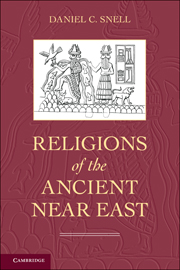Book contents
- Frontmatter
- Contents
- Figures and Maps
- Preface
- Acknowledgments
- 1 Defining Time and Space
- 2 Early Inklings
- 3 Gods, Gods, Gods
- 4 Cities, States, and Gods
- 5 The Lure of Egypt, 4000–1400 BCE
- 6 The Gods of Egypt
- 7 The Akhenaten Dream, 1350–1300 BCE
- 8 Practice in Egypt
- 9 The International Age, 1400–1000 BCE
- 10 Gods and People
- 11 The Lord Is One – Israel in Its Environment
- 12 The Turning
- 13 The Good God and the Bad God
- 14 The Lands of Baal
- 15 Greece, Etruria, Rome, and Conveying Traditions
- 16 The Dead Hand of the Past and the Living God
- 17 Experiencing Ancient Near Eastern Religion
- References
- Index
11 - The Lord Is One – Israel in Its Environment
Published online by Cambridge University Press: 05 June 2012
- Frontmatter
- Contents
- Figures and Maps
- Preface
- Acknowledgments
- 1 Defining Time and Space
- 2 Early Inklings
- 3 Gods, Gods, Gods
- 4 Cities, States, and Gods
- 5 The Lure of Egypt, 4000–1400 BCE
- 6 The Gods of Egypt
- 7 The Akhenaten Dream, 1350–1300 BCE
- 8 Practice in Egypt
- 9 The International Age, 1400–1000 BCE
- 10 Gods and People
- 11 The Lord Is One – Israel in Its Environment
- 12 The Turning
- 13 The Good God and the Bad God
- 14 The Lands of Baal
- 15 Greece, Etruria, Rome, and Conveying Traditions
- 16 The Dead Hand of the Past and the Living God
- 17 Experiencing Ancient Near Eastern Religion
- References
- Index
Summary
Not separating the fate of humanity from that of their small race, Jewish thinkers were the first who worried about a general theory of the development of our species.
– Ernest Renan, Vie de Jesus, 141It had begun innocently. The earnest young Jew, born in Babylon but educated in the traditions and languages of his people, had simply never met a kindred soul among the Babylonians themselves. But he was at a party once, a sprawling outdoor picnic with hundreds of guests who had brought their own food and were in a festive mood, celebrating the coming of the New Year at the spring equinox. Jews did not celebrate the equinox, but they did go to parties. As he was seeking a place apart to relieve his bladder of the beer he had drunk, he happened to see a tallish man with a prematurely graying beard just like his, and an alienated look, as if he were slightly annoyed with the traditions going on around him. On impulse, the Jew approached him and asked him what he did.
The man could not reply because he did not know Aramaic or, of course, Hebrew, but he had friends around who could, and so the two began a conversation of rather limited breadth helped by the occasional Aramaic translator. It seemed the Babylonian was a scholar as well, steeped in his tradition, but seeing no way to make any money out of preparing cuneiform tablets for people, he studied the texts that dealt with the stars. He was not sure how, or if, as it turned out, the stars affected human life, but he was fascinated by their movements, in which he sought regularities.
- Type
- Chapter
- Information
- Religions of the Ancient Near East , pp. 103 - 114Publisher: Cambridge University PressPrint publication year: 2010



